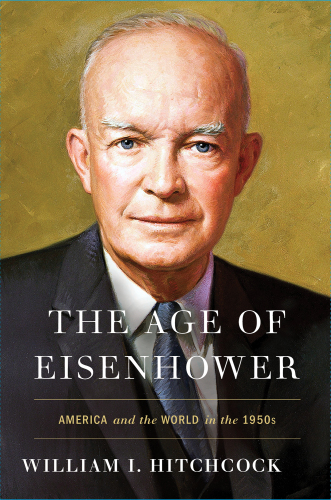
The Age of Eisenhower
America and the World in the 1950s
فرمت کتاب
ebook
تاریخ انتشار
2018
نویسنده
William I Hitchcockناشر
Simon & Schusterشابک
9781451698435
کتاب های مرتبط
- اطلاعات
- نقد و بررسی
- دیدگاه کاربران
نقد و بررسی

October 15, 2017
Pulitzer Prize finalist for The Bitter Road to Freedom: The Human Cost of Allied Victory in World War II Europe, University of Virginia history professor Hitchcock clarifies why Dwight Eisenhower ranked fifth on a 2017 survey of great presidents.
Copyright 2017 Library Journal, LLC Used with permission.

December 18, 2017
Hitchcock (The Bitter Road to Freedom), professor of history at the University of Virginia, challenges the image of Dwight D. Eisenhower as a “lightweight” and “amateur” president in this comprehensive and persuasive revisionist biography. He uses fresh documentary evidence to describe Eisenhower as “a model of loyalty, dignity, and decency” who “worked wholeheartedly and passionately for the good of his country” in domestic and international contexts. Hitchcock dubs Eisenhower’s 1952 election “a brilliant political conjuring trick” for his posing as an outsider despite the fact that he was a consummate insider. Ike’s domestic policies were informed by a “middle way” of humanely addressing social problems “within a framework of fiscal restraint, moral rectitude, and a scrupulous observance of states’ rights.” Hitchcock demonstrates how Eisenhower sidestepped McCarthyism and structured a cautious approach to civil rights and explains that Eisenhower eventually “did act, and decisively, to advance the progress of civil rights.” Explained in vivid detail, Eisenhower’s Cold War strategy was based on deterrence and intimidation, using economics, diplomacy, and above all nuclear deterrence to structure systemic resistance to Soviet provocation and expansion. Hitchcock argues that Eisenhower’s presidency is notable for its “Great Power stability and the absence of large-scale conflict,” and the author succeeds in positioning Ike as a world-historical figure. Agent: Susan Rabiner, Susan Rabiner Literary.

January 1, 2018
A lengthy, well-documented argument that "the era from the end of the Second World War up to the presidency of John F. Kennedy deserves to be known as the Age of Eisenhower."Throughout his presidency (1953-1961), most commentators considered Dwight Eisenhower "a lightweight, an amateur, an orthodox pro-business do-nothing president, a lazy leader who, despite all his grinning, was often callous and distant, more interested in golf than governing." In the decades since, his reputation has risen spectacularly, and this measured, mostly admiring biography by Hitchcock (History/Univ. of Virginia; The Bitter Road to Freedom: A New History of the Liberation of Europe, 2008) does not rock the boat. In his campaign promises, Eisenhower expressed the importance of ending the Korean War, battling communism, and balancing the budget. He accomplished all three, but the details are often unsettling. He considered using atomic weapons to break the Korean stalemate. Luckily, Stalin died in the spring of 1953, and his successors felt the war was a distraction. Eisenhower despised Joseph McCarthy, but once the senator self-destructed, the administration embraced his red-hunting agenda. The last Republican to give balancing the budget priority, Eisenhower succeeded three times and barely missed five times. Modestly opposed to discrimination, he enforced desegregation in the District of Columbia and armed forces. However, unnerved by Southern outrage when the Supreme Court ended school segregation, he confined himself to platitudes on law and order and discouraged Attorney General Herbert Brownell from enforcing it. Hitchcock praises Eisenhower for avoiding nuclear war when many colleagues yearned to get on with it, but he criticizes his enthusiasm for covert operations which, even when successful, proved calamitous. An internationalist who expanded many of Franklin Roosevelt's social programs, he never won over traditional conservatives in the party. "Modern Republicanism" peaked with Eisenhower, marked time with Nixon and Ford, crashed with Reagan, and never recovered.Despite plenty of warts, Hitchcock's Eisenhower was a hardworking, skillful president. Jean Edward Smith's Eisenhower in War and Peace (2012) remains the best modern biography, but Hitchcock's is a worthy competitor.
COPYRIGHT(2018) Kirkus Reviews, ALL RIGHTS RESERVED.

























دیدگاه کاربران